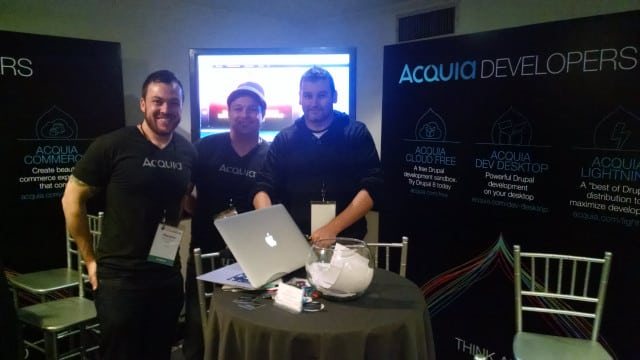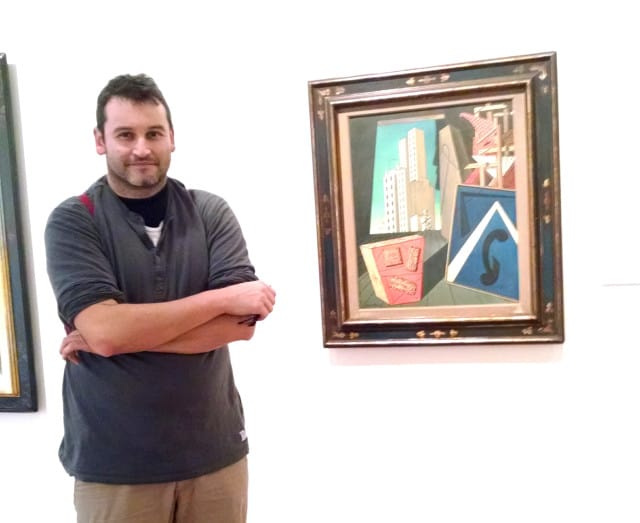Drupal left the island.
Larry Garfield brought us an awesome speech about Drupal 8.
Dries explained to us why Drupal 8 had to change. Larry showed us those changes, and everybody loved his demo, but the important thing came after that. The inline editor, content management improvements, rendering HTML5 are awesome improvements, but in the end, these are just details compared to the big message: Drupal finally left the island.
Until version 7, Drupal was built “the Drupal way”. Hooks, nodes, the Form API, all built using its own methods and vocabulary. Everything was in-house solutions. It worked great so far, but no matter how big your community is, you’re limited to your own workforce and concepts, and it has its limitations:
We need enough humility to accept that there are way better ideas floating around out there than exist in Drupal, and we should be open-minded enough to learn from them or adopt them wholesale.
This quote is not from his speech, but from his blog, as the need to look “beyond the fence” is a message he tries to spread quite often.
And he’s not talking just about code, but about the ideas and even the attitude, because opening the codebase and introducing other projects into Drupal core is not just about adopting better solutions from the outside. These are practical reasons, but there’s something more important behind this way of thinking. It means accepting other communities’ ideas, and being ready to contribute to them the same way we contribute to Drupal.
It’s not about trying to make Drupal win. It’s about trying to make other projects win with us. And this is important because of this “push paradigm future” Dries talked about. This future is already here for a handful of megacorporations: Amazon, Apple, Google, Facebook. They have an astronomical amount of data and the muscle to process it to their advantage.
How can small companies make their own space in this future without the massive resources they don’t have? Such companies, and the systems backing them, have to collaborate, because this new future can be overwhelming for any community, no matter its size, if it tries to face it on its own. Drupal was about people joining forces. Now it’s about entire communities joining forces.
Because “We are smarter than me”.
That’s cool… for new projects, but what about old projects in D6 or D7? How do we move forward?
Moving forward is in our core. Migrating into Drupal 8.
This was a more technical speech by Ryan Weal and Novella Chiechi from Kafei Interactive, Montreal, and you can see it here.
The major key point of their presentation was: Migrate is in core and it’s the preferred path. What does it have to offer and what would be your first steps.
A huge effort has been put on this migration tool, trying to overcome one of the major drawbacks of Drupal: its compromise for quality and improvement sometimes meant breaking with the old and embracing new and better ways to do things… leaving a lot of users behind, trapped in an old version with no clear update path.
While Migrate for D8 is not a magical solution, it opens the way and greatly simplifies the process, not only for D7 users, but for D6 also. And this is nothing short of amazing. There is still a gap, but the gap is closing every day a little.
As usual, this means very little for large companies with enough cash to pay for upgrades, but it lowers the bar for smaller groups with limited budgets, letting them keep their websites at a lower cost and jumping less technological barriers.
The human factor is not a “resource.” Creating a Culture of Empowerment
And last, a presentation by an extraordinary speaker: Todd Nienkerk from Four Kitchens.
Todd brought us a presentation with no code, no Drupal, no web, no technology and no processes. It was amazing.
This was a speech about management ideas that actually matter if you truly value your people. And this is a subject we’re very interested here at X-Team, where we don’t talk about “human resources”, but about “human beings”.
He started with a personal experience that is a total mind-opener: how a small detail, “bean-counter style” detail from management screwed the whole culture of a company. I won’t spoil you, but invite you to listen to it instead, starting at 2’05” of his presentation. This is probably the most interesting part of his chat.
After that, he went deep into the main subject following a structure suited for a scientific article: firstly, define the subject. What does culture and empowerment mean. Secondly, why is this a relevant subject. Thirdly, how do they try to create and maintain this culture of empowerment; and fourthly, the use of language to communicate all this, and how it makes a difference to companies that say one thing while doing another.
The use of language is a very interesting topic, as it’s a very powerful tool to create culture, even in the most subtle details. An example he used: the word “employee” creates a hierarchical structure the moment you use it. It propagates its meaning beyond its particular use case, as using it has a lot of implications: if you have an employee, you have an employer. If there’s an employer, there’s a “my employees”, and suddenly, people is not working with you because they want to. They became “your employees”, they’re “yours”. And all that comes from a single word… and the culture that generated that single word.
Todd clearly sees the language issue in a very Orwellian way: “The limits of my language means the limits of my world.” Language doesn’t express thought. It is thought.
But in the end, most of what he says is applied common sense in large quantities, and it can be tracked down to a single, very simple idea that you can’t fake: either you respect and trust the people who work with you, or you don’t. Everything else comes from this.
And it’s an issue of top relevance. Culture is the invisible glue that keeps a human group together. Quoting Nilofer Merchant: “Culture trumps strategy. Every time”.
Extra. Acquia.
In Colombia I could meet some Acquia folks, which we collaborate with on Fox. Mariano demoed Acquia Cloud for me. By a crazy coincidence, we have a common friend in Barcelona.
Conclusion
What an experience. To be honest, I expected to be the only European participant at the conference, but I was not.
Drupal 8 could have been named Drupal 11, considering the amount of changes. It’s refreshing to see the project backed by such a strong community, and see the heads keeping an eye on the future and working long-term. Drupal is healthy and strong, and it will be stronger in the future.
But sometimes I think this is becoming too corporate. Maybe Backdrop’s founders were right: how much space is there for the small fish? I don’t know.
Don’t get me wrong, I think Drupal 8 is a huge jump forward, but this doesn’t mean it is the right solution for every situation. What about smaller, more focused solutions based on Drupal?
Maybe other systems have their point.
Maybe we should have a look over the fence.
Addendum
This is me. This is Giorgio de Chirico, part of Fernando Botero’s personal collection. This photo was taken at the Botero Museum, which has an amazing collection of modern art. If you ever go to Bogotá, you have to go to the museum. I will say no more.


